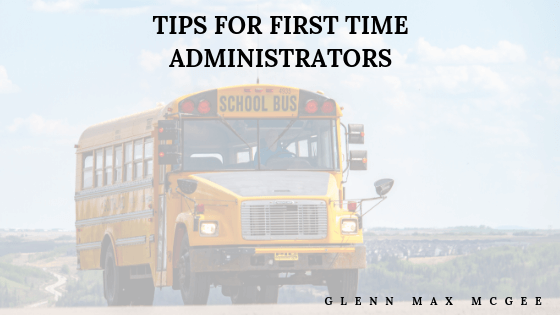Being a first-year administrator may be an intimidating introduction into the world of education far different from the classroom. On one hand, you don’t have papers to grade, but on the other hand, you also have no time as your day is a series of meetings, routine responsibilities, interruptions, emails, and minor (or major) emergencies. In the classroom you had students and your colleagues for support; first year administrators find they have no students and often minimal support until they have proven themselves worthy of trust and competence. However, there are plenty of strategies that can be undertaken in order to make things easier for the administrator as well as for teachers and students alike. The folks at edutopia (edutopia.org) share these particularly helpful ones:
Establish relationships and connect with others
Like most everything else in life, establishing authentic relationships is an important part of the quality of life and of work. Connecting with others professionally and personally is critical for administrators. As far as managing a group of people is concerned, with no connection there is no caring, with no caring there is no connection, and without a connection there will be no communication, and that’s where everything falls apart. Trusting relationships are the necessary foundation for administrative success, and first-year administrators must make time to connect and demonstrate sincere care for those who teach the children, those who parent the children, and the children themselves. This requires face time when the administrator is out and about the school, it requires regular communication through an array of sources, and it requires time for some collegial fun in and out of school.
Visit the classrooms
First-year administrators – and for that matter, veteran ones as well – begin the school year resolving to make time to visit classrooms daily but soon find that this resolution is broken as quickly as those made on New Year’s Eve. Too often it is the first thing to go when scheduling conflicts arise, and it is not uncommon for administrators to go days and even weeks without spending any quality time in class with teachers and students. Presence matters and every minute in a classroom is time well spent. In addition to enhancing the administrator’s credibility, it gives them insight into the culture of the school, how teachers and students connect, and what students are actually learning. Teachers are much more open to receiving advice and even constructive criticism if they believe that the administrator knows them, knows their students, and makes time to be in classrooms. Frequent classroom visits should not be evaluative but an exercise in empathy where the administrator can leave with a deeper and wider understanding of the opportunities, the challenges, and the successes that transpire in the school. Following each visit with a short note or even a verbal “attaboy” at the end of the day are important steps in paving the way to an administrator’s success.
Communication
Administrators, especially first year ones, need to make communication a top priority. They should begin every day thinking what and how they will communicate the school and district’s mission and vision, how they will communicate successes, and how they will communicate problems and their solutions to them. In our professional leadership and coaching sessions, we help clients craft message points that are clear and concise and then find ways to communicate them through different media. They must incorporate an array of methods that may include one-on-one conversations, a tweet, or my personal favorite – a handwritten note. No matter the medium, the message points need to be consistent and administrators will soon find that they are appreciated and respected and that the staff and students feel more engaged and connected. Administrators also need to share some personal details about what matters to them. The best leaders are those who can be both personally vulnerable and professionally courageous. Finally, communication is two-way so above all the administrator must be a careful and thoughtful listener. As Steven Covey advises, “seek first to understand and then be understood.” Rare is the rookie administrator who has mastered the art of active listening, of not interrupting, and of acknowledging and validating differing viewpoints before expressing his or her thoughts and opinions. Listening can be learned, and if our beginning administrators remember these three C’s – communication, connection, and classrooms – they are well on their way to a promising career as a true leader.

